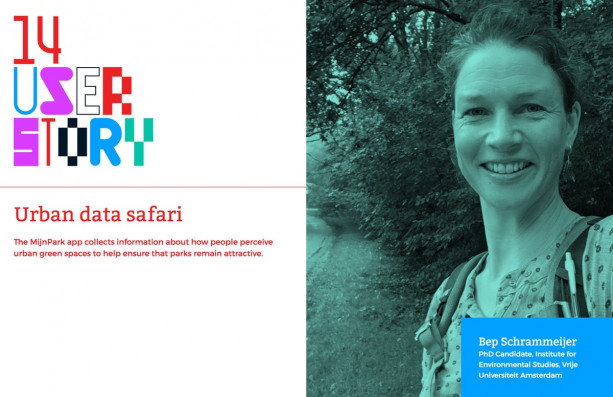Stay in the know on all smart updates of your favorite topics.
To keep Amsterdam liveable the municipality collaborates with its citizens. On average Amsterdam’s population grows with 10.000 people a year. This small big city has a density of 5065 people per square km, over 180 different nationalities. 19% of the total Dutch GDP is earned in the Amsterdam Metropolitan Area. Between 2015 and 2016, the amount of tourists in Amsterdam increased by 7%. To keep Amsterdam’s 162 canals, monumental centre and residential areas liveable, innovative initiatives are required. Share your innovative concepts and ideas here!
We Proudly Present Our Partners: Part #3 Pakhuis de Zwijger
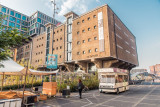
On the 21st of June we kicked off a new phase of Amsterdam Smart City. Amsterdam Smart City is an open collective of citizens, businesses, knowledge institutions and public authorities that are convinced that the changes necessary for the city and region, can only be achieved through collaboration.
More partners than ever are pooling their networks, knowledge and skills. Who are they? We will present some of them one by one. This time Pakhuis de Zwijger: ‘It is essential to make sure all Amsterdammers can decide about the future of their city.'
What is the main reason for you to join the open collective Amsterdam Smart City?
As Pakhuis de Zwijger we would like to facilitate and participate in an open dialogue on the transition of our city. We believe in the goals Amsterdam Smart City stated in the transition paths to a digital, circular and energy neutral city.
Amsterdam Smart City as a collective of cooperation is the perfect platform to achieve these goals.
What is your ambition for the city and the Amsterdam Metropolitan Area?
Pakhuis de Zwijger would always like to strengthen the dialogue between all Amsterdammers. We do this by organising events, dinners, festivals, conferences and screening films.
What do you think is the biggest challenge for the city and the region in the future?
With all the challenges of this time, like the energy transition, the unprecedented growth of the city, keeping the digital infrastructure open and accessible and the growing city moving, it is essential that we make sure that all Amsterdammers are able to participate in deciding the future of their city.
How do you see the role of the residents and citizens in your plans?
The Amsterdammers are central to achieving the goals of Amsterdam Smart City. That is why we are facilitating dialogues both in Pakhuis de Zwijger but also elsewhere in the city and through a festival like WeMakeThe.City.
What do you hope to work on in the upcoming years?
Last season we organised more than 600 events in Pakhuis de Zwijger and, together with our partners, we staged WeMakeThe.City. Next season we will certainly bring new events and a new edition of WeMakeThe.City. See our events in the calendar of Amsterdam Smart City or our website for more information.
> Let’s create better streets, neighbourhoods and cities!
Photo: Koen Smilde Photography
Knowledge Mile | Morning Meetup #19
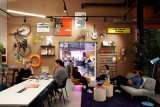
De Knowledge Mile Morning Meetup brengt je in contact met de gebruikers in het gebied van het Amstelplein tot en met het Stadhuis.
Tijdens de Meetup vertellen we je over de laatste ontwikkelingen rondom de BIZ, de drie pijlers 'talent en netwerk', 'veiligheid en openbare ruimte' en 'duurzaam en groen', Knowledge Mile Park, Petflesvrij en andere initiatieven in de buurt. Daarna is er alle tijd om ideeën uit te wisselen en nieuwe mensen te leren kennen.
PROGRAMMA
• 08:30 | Inloop met koffie & croissant
• 08:50 | Welkom en ontvangst door Cora Kreikamp (business communitymanager), Maarten Terpstra (learning communitymanager) en de TSH Collab
• 09:00 | Tijd om nieuwe mensen en start-ups te leren kennen
TSH Collab is de co-working space met de focus op Work meets life. Een volledig leefbare werkplek voor creatieven en ondernemers met een echte student mind-set. Als onderdeel van The Student Hotel familie bieden wij naast werkplekken ook onze eigen restaurant the Commons, sportzaal, wasserette, parkeerplekken en gemeenschappelijk bed aan (hm, kom dit zelf maar bewonderen) Momenteel zijn we druk bezig met de start van het nieuwe ‘school jaar’. De nieuwe freshmen coworkers verwelkomen in TSH Style. Hierover meer op 9 oktober!
Jouw project in de update
Wil je dat jouw project genoemd wordt in de update? Geef dan hieronder in de reacties aan wat de ontwikkelingen zijn van jouw project. Dan benoemen we dit tijdens de Update.
Banks and Retailers Are Tracking How You Type, Swipe and Tap
Interesting read in addition to Weapons of Math Destruction by Cathy O'Neil
By Stacy Cowley, NY Times, 2018/08/13.
When you’re browsing a website and the mouse cursor disappears, it might be a computer glitch — or it might be a deliberate test to find out who you are.
The way you press, scroll and type on a phone screen or keyboard can be as unique as your fingerprints or facial features. To fight fraud, a growing number of banks and merchants are tracking visitors’ physical movements as they use websites and apps.
Some use the technology only to weed out automated attacks and suspicious transactions, but others are going significantly further, amassing tens of millions of profiles that can identify customers by how they touch, hold and tap their devices.
The data collection is invisible to those being watched. Using sensors in your phone or code on websites, companies can gather thousands of data points, known as “behavioral biometrics,” to help prove whether a digital user is actually the person she claims to be.
To security officials, the technology is a powerful safeguard. Major data breaches are a near-daily occurrence. Cyberthieves have obtained billions of passwords and other sensitive personal information, which can be used to steal from customers’ bank and shopping accounts and fraudulently open new ones.
“Identity is the ultimate digital currency, and it’s being weaponized at an industrial scale,” said Alisdair Faulkner, one of the founders of ThreatMetrix, which makes fraud detection software for large merchants and financial companies. Many of his company’s customers are now using or testing behavioral biometric tools, he said.
Privacy advocates view the biometric tools as potentially troubling, partly because few companies disclose to users when and how their taps and swipes are being tracked.
Continue reading >>>
Onderzoeksproject Catalyst
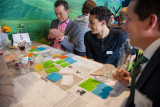
Voor dit onderzoeksproject zijn we nieuwsgierig hoe kunst kan helpen om bewoners en andere stadsgebruikers een mening te laten vormen over de slimme stad.
We doen dat in drie rondes, waarbij we steeds meer de diepte ingaan:
* De eerste ronde vindt plaats op straat; voorbijgangers worden geprikkeld om over de slimme stad na te denken door middel van kunstinstallaties en onzichtbaar theater.
* Ronde twee vindt plaats in buurthuizen; bewoners en andere stadsgebruikers worden gestimuleerd om een mening te vormen over de slimme stad.
* Ronde drie vindt plaats bij het NEMO Science Museum en brengt bewoners in gesprek met slimme stadsmakers, zoals technologieontwikkelaars en beleidsmakers.
Daarbij hebben we steeds drie vragen:
* In hoeverre helpen de kunstinstallaties en theaterstukjes om de slimme stad relevant te maken voor deelnemers? Wanneer ervaren deelnemers het als leuk en belangrijk om een mening te vormen over de slimme stad?
* In hoeverre helpen de kunstinstallaties en theaterstukjes deelnemers om de verbeelding te stimuleren? De slimme stad is voor veel mensen een abstract begrip. Hoe kan kunst helpen om de slimme stad tastbaar en bespreekbaar te maken?
* In hoeverre helpen de kunstinstallaties en theaterstukjes deelnemers om gefundeerde mening te vormen over de slimme stad? wat helpt deelnemers om niet alleen een mening te vormen, maar ook van zichzelf te begrijpen waar deze mening vandaan komt?
We onderzoeken deze vragen op een kwalitatieve manier, namelijk door middel van observaties en interviews. De publieksactiviteiten vinden plaats in Amsterdam tussen september 2018 en januari 2019.
Designing your initiative for success | SDG Action Day

Learn how to take your Sustainable Development Goals (SDGs) initiative forward, whether as an entrepreneur or intrapreneur.
Committed to the SDGs and systemic change, the Impact Hub Amsterdam team and entrepreneurs will share several mental models and tools as well as provide space to innovate your initiative and in-build engagement strategies. No previous experience necessary. Bring your own project or initiative if you have one!
This session is a part of the SDG Action Day, an initiative by SDG Charter, SDG House (KIT Royal Tropical Institute), the City of Amsterdam and NCDO.
MORE ABOUT THE SDG ACTION DAY
You don’t need the capital of Bill Gates or the influence of Jane Goodall to change the world. No, everyone can join in achieving the Sustainable Development Goals (SDGs): 17 world goals to turn today’s greatest challenges into opportunities for everyone. Whether you are familiar with the SDGs or it’s quite new material for you, everyone who wants to follow through with his or her SDG-ambitions, is welcome on the SDG Action Day on September 25th at the KIT / SDG House in Amsterdam.
Video: Citizens' initiatives in Amsterdam
On the 21st of June, the launch of the new Amsterdam Smart City took place. Our open collective, with more partners than ever, incorporates citizens in the city challenges. But many initiatives arise from residents themselves. We talked to a few of them to hear how they 'make the city'.
The video is in Dutch and has subtitles in English.
Crowdsensing Rembrandtpark
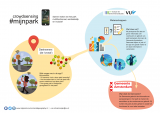
Urban green is good for your health. Urban green is good for social cohesion and Amsterdam’s city parks are being used more and more intensively. It is the City of Amsterdam’s responsibility to ensure that the parks remain attractive for everyone, but how? The Institute for Environmental Studies (IVM) at the VU is working together with the Gemeente Amsterdam on an app that collects information about how people perceive and use urban green spaces. A pilot is being conducted in the Rembrandtpark to see how such information can inform park renovations.
An example of the first results may look like this:
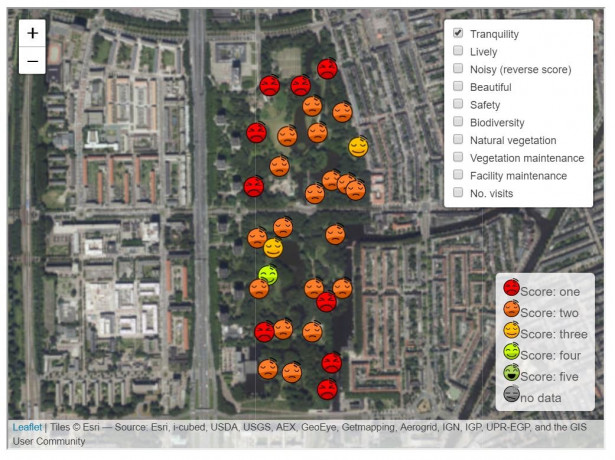
Are you visiting the Rembrandtpark? Go to http://mijnpark.environmentalgeography.nl/ to join!
Smart Stories
Check the article about MijnPark featured in our online magazine 'Smart Stories':
The smartest cities are reinventing themselves
In my newest post, I am featuring Barcelona as a (smart) city that in ten years changed from smart city 1.0 (company oriented), smart city 2.0 (problem centred) to smart city 3.0 ( citizen centred). In the same post I also describe the impact of the use of smart phones on the number of digital solutions which are available, using a brand new study of McKinsey: Smart Cities: Digital solutions for a more livable future
MakeHealth: Prototyping II
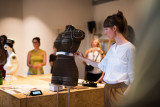
The second series of MakeHealth: Prototyping starts 22 September 2018 at Makerspace Contact.
Do you have an idea for a care solution that makes everyday life easier? Or have an aid of which you think it could be designed better? Are you a designer, an experiential expert, a healthcare professional, or an informal carer with a great idea for a healthcare solution?
At MakeHealth: Prototyping you'll be working in a team on a concrete question once per week over an seven-week period. This question could be about developing a new solution to a problem or improving an existing tool.
With MakeHealth we want to develop new, open design applications and publish these online. Your solution, including all the design files and instructions will become available on the international platform Careables. That means anyone can reproduce or adapt your solution. So you not only helping your team, but society as a whole will benefit!
Practical information
All meetings of MakeHealth: Prototyping II will take place on Saturday from 10:00 - 14:00 hrs. The next series starts on 22 September. The last meeting will be on 10 November. Participation is free. The prime language will be Dutch, but don't worry, we can easily switch to English when necessary. Register via Eventbrite.
Prior knowledge of digital manufacturing and technology is not required as we'll focus on this during the workshops. However, we do expect you to attend all the workshops, so that your team have enough time to complete their project.
Location
All meetings take place at Makerspace Contact; a location that is fully accessible by wheelchair users. The address is: Contactweg 47, 1014 AN Amsterdam. The location can easily be reached by metro near station Amsterdam Sloterdijk and has parking facilities nearby.
Programme
Meeting 1 - 22 September
Introduction to the theme, possible topics, and formation of teams. Each team begins brainstorming ideas about possible solutions. Joint decision on team's direction going forward.
Meeting 2 - 29 September
Research on possible applications, materials, and techniques. Start first designs.
Meeting 3 - 6 October
Developing designs: create drawings or models, choose material and plan for production. Start prototyping.
Meeting 4 - 20 October
Creating prototype. Experiment with materials and manufacturing techniques.
Meeting 5 - 3 November
Finish prototype and documentation.
Exposition - 10 November
Presentation of final prototypes. Looking back on learning moments and tips.
We Make Amsterdam Resilient
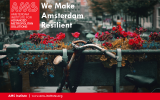
The increasing changes (in the weather, economy, politics and the socio-technical infrastructures etc.), bring next to new opportunities also new challenges and require us to rethink the way we co-create resilient cities in terms of energy, food, mobility and living.
Stay tuned via this channel for the date and time of the next event or contact me for questions via:
Calling our King: a 'boring revolution' is needed to share responsibility

In his most recent speech, the Dutch King Willem-Alexander stated that "a connected society above all means a shared responsibility". During his work visit to our project "Amsterdammers, Make your City!" in the Amsterdam Kolenkit neighbourhood, he witnessed what this means in practice.
As the organisers of Make your City, we emphasised that this shared responsibility can only exist if there is a proper infrastructure for citizens' initiatives. The outline for which we developed in our project Amsterdammers Make your City!
Read the full article here (Dutch only) https://www.kl.nl/nieuws/oproep-aan-de-koning-voor-gedeelde-verantwoordelijkheid-is-een-boring-revolution-nodig/
Dutch
In zijn meest recente troonrede stelde onze Koning dat "een verbonden samenleving bovenal een gedeelde verantwoordelijkheid is". Tijdens zijn werkbezoek aan ons project Amsterdammers, Maak je Stad! in de Amsterdamse Kolenkitbuurt zag hij wat dit in de praktijk betekent. We drukten hem op het hart dat die verantwoordelijkheid alleen kan bestaan als er een goede infrastructuur voor burgerinitiatieven is; één van de belangrijkste lessen uit ons project Amsterdammers Maak je Stad!
Lees het volledige artikel hier: https://www.kl.nl/nieuws/oproep-aan-de-koning-voor-gedeelde-verantwoordelijkheid-is-een-boring-revolution-nodig/
Pitch your sustainable Amsterdam! // Pitch je duurzame Amsterdam voor de wethouder!
Amsterdam needs to become more sustainable. Energy neutral and zero waste is the future. This will be shown on Thursday 26th of July. Who will do it? You!!
- continue reading in Dutch
Amsterdam staat voor een flinke uitdaging: de verduurzaming van de stad. Energieneutraal en afval als grondstof is de toekomst. Dat laten we zien op donderdagmiddag 26 juli. We? U! Jij!
Wethouder Ruimtelijke Ontwikkeling en Duurzaamheid Marieke van Doorninck maakt graag kennis met minimaal 12 duurzame Amsterdamse initiatieven. Mensen, organisaties en start ups die samen bezig zijn met een schonere wijk, aardgasvrij, of samen energie besparen. Met hun buren, familie, collega's of vrienden.
De mooiste initiatieven krijgen het podium om zich op 26 juli kort te presenteren. Ter lering, inspiratie en vermaak. De one minute pitches worden aangevuld met verdiepende gesprekken over de opgave van de stad. De middag wordt afgesloten met een netwerkborrel.
Uw duurzame Amsterdam pitchen? Kijk naar de voorwaarden hieronder en meld u voor 18 juli aan via dit aanmeldformulier: https://www.amsterdam.nl/formulieren/wonen-leefomgeving/duurzame-middag/
Datum: donderdagmiddag 26 juli
Tijd: 13:30-17:30 uur
Locatie: Wibautstraat Amsterdam
Voorwaarden: wat we u vragen
■ U vertegenwoordigt een georganiseerde partij die zich inzet voor projecten in de gemeente Amsterdam op het gebied van aardgasvrij, duurzame energie, circulaire economie en / of afval
■ Bij een overschrijding van het aantal beschikbare plekken vindt er een selectie plaats op basis van variatie van thema, locatie en organiserende partijen.
[DISCONTINUED] Amsterdam Innovation Tour (self-guided via app)
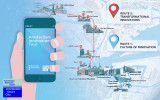
The app is designed to help international delegates and local city users experience some of Amsterdam’s innovative approaches and solutions for smart and sustainable urban development.
During the 2018 We Make The City innovation festival, Amsterdam Smart City and the City of Amsterdam released an app-based, self-guided innovation tour which is now available via the Apple Store and Google Play.
The app is designed to help international delegates and local city users independently experience some of Amsterdam’s innovative approaches and solutions for smart and sustainable urban development.
There are two routes to choose from, both starting from Central Station.
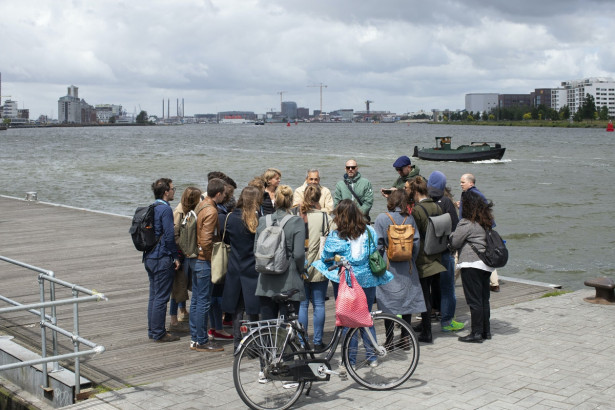
© Thomas Schlijper
The first route “Culture of Innovation” takes users on a two-kilometer walk along Oosterdokseiland development to Marineterrein, the former navy base that is being converted to innovation district. The second route, “Transformational innovations” leads users through Amsterdam North to De Ceuvel living lab and finishes at NDSM-wharf.
<em>App download</em>: Apple Store and Google Play
USA school teacher: opportunities to learn about Dutch climate mitigation/adaptation strategies Jun28-July7
Hello! I'm hoping (at the very last minute) to connect with some folks who might be interested in sharing their work with me through a brief informal tour or interview while I'm here in the Netherlands for the next 8 or 9 days. I'm here with the help of a small, self directed grant to develop a unit of study for my students in Chicago that will inspire them to better understand climate change as a global issue with which they can engage in creative ways in their local context. I'm interested in more or less any and all work happening around Amsterdam (or Utrecht, where I'll be from July 3-July 5, or Wageningen, July 5- July 7) that relates to the effects of climate change or mitigation/adaptation strategies. This could include any climate relevant public or private work in the electricity, transportation, building, industrial, agricultural, tech, or education sectors. For example, if you are involved with a start up that does circular economy work that reduces emissions, have a perspective to share on regional transportation, know something about zero emission architecture, or work in education and are interested in developing collaborations in terms of sustainability/climate curriculum, I'm interested in hearing from you and (in an ideal world) chatting for 30 minutes or an hour. My students are typically low income, racial minority teenagers who I believe need to be empowered to make the future as much as their economically well off and culturally "mainstream" peers. Most of my students are also soon to be voting eligible citizens of the USA, which seems relevant. Anyway, I appreciate you considering my vague request! I am of course thrilled about the wealth of resources available through Smart City Amsterdam (including the very cool new Amsterdam Innovation Tour app), and I've booked, for example, a standard tour on Friday through architour. But unfortunately my dates of travel did not align with WeMakeTheCity, the ASC Open House is not happening this Friday, and many of the other tour options are out of my price range as an individual traveling on a small grant. Thanks for any and all input. Cheers!
Hoe groen en blauw kleurt Amsterdam eigenlijk?
#GroeneKaartvanAmsterdam crowdfunding nu online op 'Voor je buurt'.
https://voorjebuurt.nl/nl/projects/groenekaartvanamsterdam
Hoe groen en blauw kleur Amsterdam eigenlijk? Wij denken dat mensen anders naar Amsterdam zullen kijken, als ze deze kaart straks in handen hebben. Niet alleen raak je geïnspireerd, maar heb je ook een ‘instrument’ in handen om nog beter de dialoog te voeren over de noodzaak van stedelijk groen. De Groene Kaart van Amsterdam is er voor iedereen die houdt van Amsterdam, van groen en/of van cartografie. We hebben jouw steun nodig om onze droom te verwezenlijken. Zou jij ook kunnen helpen?
Hoe? Door financieel bij te dragen aan de realisatie van de Groene Kaart van Amsterdam. Dit kan al vanaf 15 euro (de donateurs krijgen later dit jaar de kaart, inclusief verzendkosten). Ga naar: https://voorjebuurt.nl/nl/projects/groenekaartvanamsterdam/plan
Door mee te denken. Heb jij vrienden, kennissen of collega’s die ook de Groene Kaart van Amsterdam willen steunen? Of ken je bedrijven, instellingen of fondsen die ons kunnen helpen?
Of door de campagne te delen (op de sociale media). Alle informatie over deze grote, stoere papieren Groene Kaart van Amsterdam vind je online op de pagina van de crowdfunding.
Future Citizens in Noord

Visit A Lab during the Wemakethe.city and ROEF festival for a program about citizens and the future. In A Lab we try to find out what crossovers between for example journalism and blockchain, music and robotics, games and art mean for the future in our building, a ‘broedplaats’ community of 300 creative, innovative and social relevant Members. For WeMakeThe.City we will research what humans mean for the future and what the future holds for us:
• 17:30 kickoff of the night, make sure you are there on time!
• celebrate the official opening of the photo exposition 'Buurtbanden' by Rufus de Vries where you can get to know the different citizens and neighborhoods of Noord
• participate in the dance performance about autonomy ‘Walkie Talkie Wilderness’ by inclusive dance school Misiconi Dance Company (http://misiconidance.nl/)
• think about and discuss the future of cities with AI, drones and self-driving cars during Think Future Today #3: The Vulnerability of a Smart City organized by 361degrees LAB. RSVP for this activity by attending the Think Future Today facebook event!
• enlarge your city view & knowledge and call with other cities Groningen and Limburg to get inspiration in the activity 'Small Stream Media' by VersPers
• last but not least, you get the chance to discover the future of food with our vertical farm grown salad hosted by OneFarm!
-- About WeMakeThe.City --
WeMakeThe.City is the festival that aims to make the city better. Already on the 5th edition, the festival will investigate important urban issues about Amsterdam Metropolitan Area and respond to many questions that everyone has on the future of our city. The program is very diverse, with dozen locations spread over the city, you can attend lectures, film screenings, exhibitions, shows, city expeditions, games, workshops, expert meetings, interviews, labs, workshops and many more. Visit their website for more information: https://wemakethe.city/nl
Is Amsterdam ready for a "Social Credit Score"?
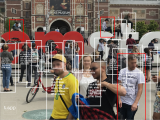
Next week, as part of We Make the City, we will be demonstrating some of the latest camera and object recognition technology and discuss the past, present and future of neighborhoods and how they relate to public data collected as a service solution vs a surveillance system.
Join us on Thursday June 21 at 2PM at Makerversity (part of the Marineterrien) for a thought provoking panel of guests including: Marc Schoneveld (DataLab), Bert Spaan (city data applications), Kim Smouter (Head of Public Affairs & Professional Standards, ESOMAR) and Tom van Arman (CITIXL).
Signup here: http://bit.ly/2JMLreQ
Why are we doing this?
The Chinese social credit system (SCS) was rolled out in 2014 and is planned to be fully implemented by 2020. That means that more than 1.4 billion Chinese either are currently or will be registered and tracked within the next few years. The Chinese government claims to use the system to both regulate the economy and individual citizen behavior by monitoring “trustworthiness”. According to the policy "It will forge a public opinion environment where keeping trust is glorious. It will strengthen sincerity in government affairs, commercial sincerity, social sincerity and the construction of judicial credibility." The Chinese government gathers information about its citizens’ including facial recognition, online behavior, spending, travel, social interactions and more. It is using this big data to provide individuals a social score that if high leads to privileges, but if low restrictions or punishment such as slower internet, restricted borrowing, travel bans, lowered status in dating apps and yes even less toilet paper in public restrooms.
This isn’t a Black Mirror episode,. Research shows that more than 90% of people rely on online reviews, so why not people reviews? While the Chinese government is using SCS to encourage trustworthy behavior, private industry is also venturing into people reviews and ratings. One such company, Peeple, released an app that allows individuals to review friends, colleagues, babysitter, dates and even enemies. The idea of this app outraged many in 2015 when it was unveiled and it has struggled to gain followers, but it could be just a matter of time before social rating systems become a way of life… and is it really so different from China’s SCS?
What are the dangers of this type of social scoring? Perhaps more importantly, what are the implications of harnessing big data from our traditional public commons? We have long had CCTV cameras in many of our big cities, including Amsterdam, for security purposes, but now technology such as machine learning and artificial intelligence (AI) can use this data, combine it with other data and the use-cases are boundless. But the question is who will decide how this data should be used and when is it in the best interest of our citizens?
Good Intentions
They say history repeats itself and I cannot help but recall what happened here in the Netherlands…back in 1936 it became mandatory for each Dutch municipality to maintain a demographic record of its inhabitants and by 1939 everyone was required to carry a persoonskaart or a personal id card that contained information deemed important by the Nederland Bureau of Statistics including gender, age, religion, pollical party, heritage or “ethnic origins.” All of the information was stored centrally using, at the time, a technologically advanced “Hollerith punch-card” system. While the Dutch government collected and held the data for the best intentions, we all know what happened when Germany invaded and gained access to all of the centrally held data and processing power.
Fast forward 82 years and we no longer need personal identity cards when most of today’s cameras can recognize our faces in public and private domains. Should we be concerned? Is there a way to embrace technological advances for the “good” and somehow mitigate the risks? The famous historian, philosopher and author Yuval Harari said in his TedTalk that he “never underestimates human stupidity.” What I think he means by this is that history repeats itself in various ways and we often think it is a completely new situation, but it is often the same problem in a new context. For example there are lots of rights we rights we 21st century consumers will wave if we have to sacrifice convenience. The disruptive technology of today is a double-edged sword with wonderful potential to solve many of our world’s most pressing problems, but that potential also can, if we do not critically assess, have horrendous consequences. We, as citizens need to take responsibility and educate ourselves about what is happening in our increasingly complicated world. Unfortunately, it is as grave as it sounds. There is no reset button. It is our responsibility to make smart choices now for our future.
Initiative against Food Waste
Healthy & Affordable is a project existing since 2013 which aims to reduce the amount of food being wasted in Amsterdam, and the Netherlands. As such, it aspires to become a social business through scaling up and creating more impact.
The great changemakers at Healthy & Affordable collect food which is no longer wanted because of its shape, size, defects, wrinkles, etc, but is still nutritious and yummy. We then process it in different ways such as drying, freezing, or pickling, preventing it from being wasted, reviving it to be a consumable product again, just in a different form.
You can also become a change maker through our crowdsourcing campaign, there are many ways you can help, not only financially.
The project is part of the endeavours of Sapient Social & Environmental Enterprises to create more sustainable solutions to challenges our society is facing. We are also part of Food Circle, the food waste organisations network.
Our facebook pages:
https://www.facebook.com/HealthyandAffordable/
https://www.facebook.com/sapientsee/
https://www.facebook.com/FoodCircleAms/
Our website: https://sapientnl.wixsite.com/sapient
We are looking for new partners to extend our network! If you are interested in getting acquainted with our projects, you can send an email to sapientsee.social@gmail.com
Let's struggle against food waste!
Darwinism in a Smart City
The increasing digitalization of our society splits our world into different camps. People who can and want to cope with the digitalization and people who already have difficulty with the current developments.
The first group talks about the new options and admires every step forward in this field. Whereas the second group seems to find it an undesired development or keep describing it as a hype that will pass. ‘Everything will go back to the old days.’
How to deal with a digitized city, often referred to as a Smart City, where only part of the population understands or desires the new functionalities?
A hundred newsletters later... 💯

Most community members on this platform find their way via the Weekly Update which we send out every week. This week the 100th edition will be out, what a number! This means 100 weeks of great content, active community and you who read, comment and share the writings of smart city topics.
Did you know ...
Did you know...
1. That the first newsletter was in August 2016?
Once a week for two years makes 100 weekly updates! The weekly update started together with the formation of the online smart city community. The Amsterdam Smart City program has been running since 2009, but we are an open collective, so with this community everybody can join! We now have over 5000 people connected to our network.
2. Our first newsletter was sent to 384 people?
The first newsletter was called "the latest news" and was sent to 384 people. Now the updates are sent to 4233 people all over the world!
3. The best read articles are about open data and startups
There is high interest in articles about the open use of data by governments, such as the open data portal of Amsterdam at data.amsterdam.nl. Also startups are a hot topic, and the startup ecosystem in Amsterdam is something to keep an eye on! Of course the job openings are clicked a lot too! Did you know we are currently looking for an intern?
4. That you can be in the newsletter too?
Everything you read in the newsletter comes straight from the platform! So you can upload your update, request, eventor project, and get a chance to be featured in next week's Weekly Update! We don't receive advertising money or let something else influence our editor's pick.
You can find our Weekly Update archive here: https://us14.campaign-archive.com/home/?u=a88e1cb79a0eb3c0b0dc7ff5a&id=91cba1912c
And tomorrow number 100 in your mailbox!
[](<iframe src=)
Stay up to date
Get notified about new updates, opportunities or events that match your interests.
